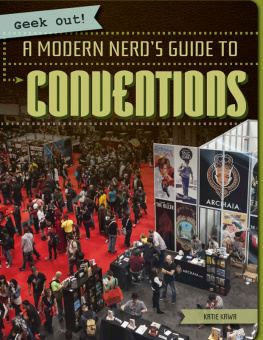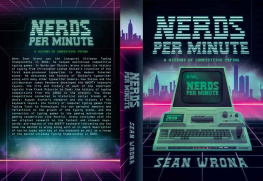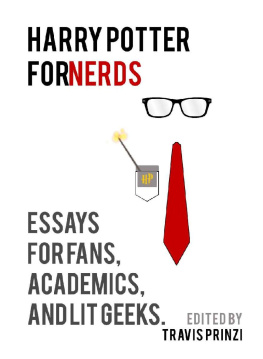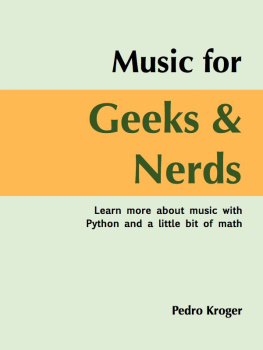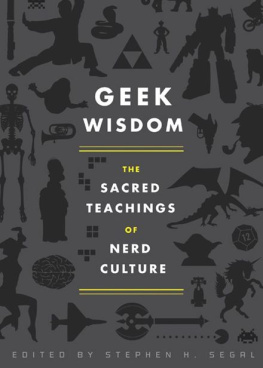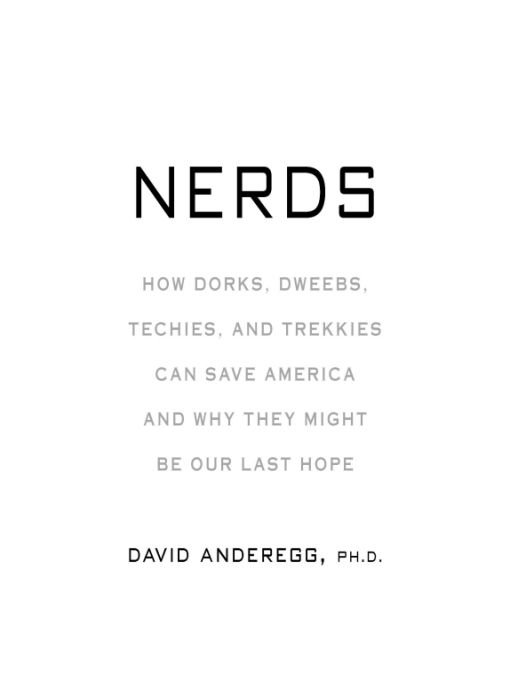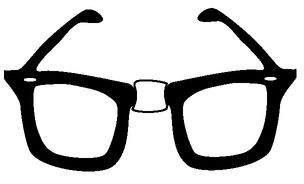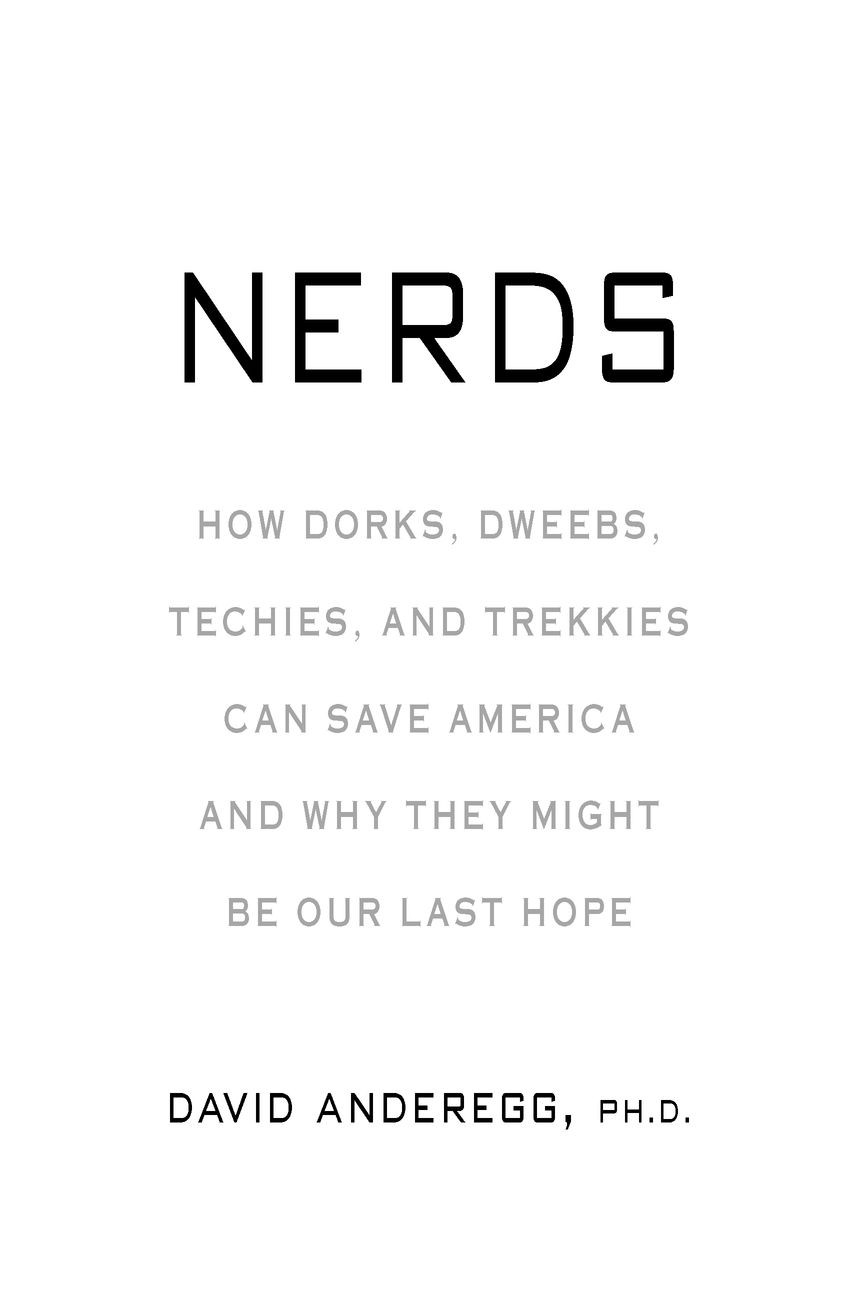Table of Contents
ALSO BY DAVID ANDEREGG
Worried All the Time: Rediscovering the Joy
in Parenthood in an Age of Anxiety
JEREMY P. TARCHER/PENGUIN
a member of Penguin Group (USA) Inc.
New York
For Kelley
love, all ways
ACKNOWLEDGMENTS
Where does one start? To begin at the beginning, I would have to thank my old teacher Mrs. Holman, for giving me the part of the Dictionary in our fourth-grade play at the Henry G. Rosenow School in Fond du Lac, Wisconsin. That experience playing a know-it-all, and the play itself, made me ask myself a lot of questions, which I am finally getting around to answering. So thank you, Mrs. Holman... I think.
But later-arriving bystanders deserve much more in the way of gratitude. I wish to thank Gareth Esersky and Carol Mann for their persistent belief in this project, and Kat Kimball and Sara Carder at Tarcher/Penguin for their diligent efforts to see it through. Dean Elissa Tenny at Bennington College supported the project early on, and I am grateful for her support.
My students at Bennington, all of them, have been my guides, my cheerleaders, and my windows on the world of popular culture. The students in my research seminar, where we spent an entire year hip-deep in nerds, deserve a special nod: Zach Hill, Danny Grossman, Spencer Binney, Sera Vautier, and Nina Rudnickmay you all live long and prosper.
Many other informants, of course, have given me the gift of their time and thoughtful answers to my nagging questions. These include my patients and their parents and the other kids I talk toneighbors, nephews, and total strangers. Thank you, one and all, for thinking out loud and allowing me to listen.
Writer friends always need to be thankedthey get so little gratitude elsewhere. I wish to thank one particularly encouraging writer pal, Michelle Gillett, whose simple question Are we dweebs? has been an endless source of inspiration.
My wife, Kelley DeLorenzo, serves as my chief critic and my biggest fantwo unrewarding jobs that are even more unrewarding when performed simultaneously. Thank you, dear Kelley, for your constant love and protection.
INTRODUCTION TO THE PAPERBACK EDITION
When Nerds first appeared, at the very end of 2007, I felt I was asking my readers to do a simple task: just look at this one ingrained American prejudice, and look at its effects. Thats all. I wasnt asking readers to solve Fermats Theorem, or to understand once and for all the mysteries of Keynesian economics. I asked people to think about what we tell our children about those people we call nerds, and think for a minute about what message we might be sending. I know; it seems naive now, but thats how naive I was back in 2007.
It turns out that asking people to examine prejudices is really hard. One reason its hard is that prejudices are ubiquitous and therefore hard to examine. Its like asking people to look at air, or to look at negative space. It can be done, but it requires a little effort. American anti-intellectualism has been going on for so long that people think of it as part of the American landscape, as immutable as the purple mountains majesty. We all know the central fact of the nerd/geek stereotype: that smart people cant also be sexy, and sexy people cant also be smart. This is untrue, as we all know, but I try to point out that we all know it because someone taught it to us. Trying to get people to unlearn this untrue fact has proven to be more difficult than I imagined. But prejudices are feelings, after all, and asking people to examine their prejudices calls up strong feelings... on all sides of the question.
The biggest source of resistance to my central thesis has been from hip post-adolescents who believe that they have outgrown nerd/geek stereotypes. In talking with people about this book in the past two years, I have had innumerable twenty-somethings (interviewers and reporters, mostly) say to me, in some form or another, Whats the big deal? We now know nerds and geeks are cool. Its that royal we that always gets in the way: the twenty-something is really saying, The anti-intellectual prejudice I had when I was in middle school has been superseded by something hip, cool, and ironic. I am now happy to dress or even act like a geek because I can ironically embrace a vilified stereotype. To which I have replied, with varying degrees of patience, Okay, fine, glad you finally woke up, but youre not in middle school. Anti-intellectual stereotypes are important to examine because of their effect on our children. Im a developmental psychologist: I spend a lot of time with kids, and I know that childrens thinking is not like ours. Kids in seventh grade are rarely hip, cool, and ironic in the multilayered, po-mo fashion of urban reporters or media people. Kids in seventh grade think nerds are just awful, and they make life decisions accordingly. Some of those life decisions involve not studying science and math, which is a bad thing for them and for our country. Years later, when kids eventually get with it and learn that nerdiness itself is a stupid conceit, they feel a modicum of embarrassment, but they rarely then go back and study calculus. So, while I am happy that many hipsters have outgrown their prejudices, I still think those prejudices are a big deal.
Another objection to my claims has come from nerd-labeled people themselves. In late 2009, in a moment of crankiness, I gave an interview to a business reporter for The New York Times in which I said I thought the terms nerd and geek should be banned outright because of their negative effects on kids. It turns out that a lot of nerd-labeled people are free-speech enthusiasts, and I was pilloried again in blogs all over the world for saying that (1) nerd/geek prejudices still exist and still affect kids, and (2) we adults bear some responsibility for these stereotypes propagation. To those who have adopted a term of derogation as a badge of honor (geek pride and all that) I say, You go, geek. But dont pretend to me that your personal achievement in overcoming prejudice is a universal achievement. Because I still talk to kids every day who tell me, Yeah, I could be getting As in school instead of Cs, but I dont want people to think Im a nerd. I still talk to kids who want to die because other kids scream at them, literally scream at them, in the halls of junior high schools, GET AWAY FROM ME, NERD! because they did really well on a math test.
Despite my own efforts in this book, and despite the coolitude of the postadolescent-prejudice crowd, the bad news is that the nerd/geek trope still exists, in school hallways and in the national media. It is the favorite of lazy journalists everywhere, people looking for a familiar hook for their stories. In this lazy world, people still think that physical beauty or sexiness and intellectual achievement are mutually exclusive. A recent example: In August 2010, a story appeared in The New York Times about Wisconsin congressman Paul Ryan, the new darling of the theoretical right. In this article, we learn Ryan is fit from years of an intense exercise program called P90X and has hair as thick as Rod Blagojevichs (and cut in a more contemporary fashion). Ryan has become a regular on the cable news circuit, and a book he co-wrote about conservative politics... will include his picture on the cover when it comes out this fall. He sounds kinda dreamy, huh? But wait: In the next paragraph, we learn that the inner nerd seeps through: he often sleeps on a cot in his office, says he has every 15-minute interval until September scheduled, and writes up these Power-Points himself (I really like PowerPoint). The story could have said, This guy has it all.... He works out, he looks good, and he is also smart and hardworking! But what is being said about Ryan? He looks pretty, but on the inside he is


